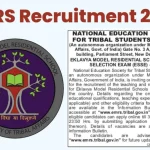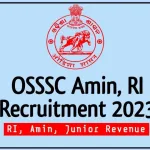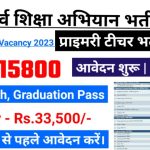EMRS recruitment is a structured process conducted by the Ministry of Tribal Affairs to hire qualified educators and administrative staff for Eklavya Model Residential Schools (EMRS).
These schools aim to provide quality education to tribal children in remote areas of India. The recruitment encompasses various positions, including Principals, Vice-Principals, Post Graduate Teachers (PGTs), Trained Graduate Teachers (TGTs), Physical Education Teachers (PETs), and non-teaching roles such as Accountants and Nurses.
Candidates must meet specific educational and experience criteria for each role and undergo a rigorous selection process that includes a written examination, interview, and document verification. Successful candidates receive competitive salaries, benefits, and comprehensive training to prepare them for their roles. EMRS recruitment ensures that dedicated professionals are hired to contribute to the holistic development and educational empowerment of tribal students, fostering inclusive growth and cultural preservation.
Recruitment Process in EMRS
Recruitment in EMRS is a well-structured process aimed at hiring the best educators and administrative staff. The recruitment is typically conducted by the National Testing Agency (NTA) on behalf of the Ministry of Tribal Affairs.
Types of Positions Offered by EMRS
The Eklavya Model Residential Schools (EMRS) recruitment for 2024 offers various teaching and non-teaching positions. Here are the details of the available jobs, including educational qualifications, age limits, and salary information:
Teaching Positions
- Principal
- Educational Qualification: Master’s degree, B.Ed or equivalent, proficiency in Hindi and English, 10 years of teaching experience.
- Age Limit: Not specified.
- Salary: Level 12 ₹78,800 – ₹2,09,200 per month.
- Post Graduate Teacher (PGT)
- Educational Qualification: Master’s degree in relevant subject with 50% marks and B.Ed.
- Age Limit: Not specified.
- Salary: Level 8 ₹47,600 – ₹1,51,100 per month.
- Trained Graduate Teacher (TGT)
- Educational Qualification: Bachelor’s degree in relevant subject with B.Ed.
- Age Limit: Not specified.
- Salary: Level 7 ₹44,900 – ₹1,42,400 per month.
- Art Teacher
- Educational Qualification: Degree in Fine Arts/Crafts or B.Ed in Fine Arts.
- Age Limit: Not specified.
- Salary: Level 7 ₹44,900 – ₹1,42,400 per month.
- Music Teacher
- Educational Qualification: Bachelor’s degree in Music.
- Age Limit: Not specified.
- Salary: Level 7 ₹44,900 – ₹1,42,400 per month.
- Physical Education Teacher
- Educational Qualification: Bachelor’s degree in Physical Education.
- Age Limit: Not specified.
- Salary: Level 6 ₹35,400 – ₹1,12,400 per month.
- Librarian
- Educational Qualification: Degree in Library Science or Degree with Diploma in Library Science.
- Age Limit: Not specified.
- Salary: Level 7 ₹44,900 – ₹1,42,400 per month.
Non-Teaching Positions
- Accountant
- Educational Qualification: Bachelor’s degree in Commerce.
- Age Limit: Not specified.
- Salary: Level 6 ₹35,400 – ₹1,12,400 per month.
- Junior Secretariat Assistant (JSA)
- Educational Qualification: 12th pass with typing speed of 35 wpm in English or 30 wpm in Hindi.
- Age Limit: Not specified.
- Salary: Level 2 ₹19,900 – ₹63,200 per month.
- Lab Attendant
- Educational Qualification: 10th pass.
- Age Limit: Not specified.
- Salary: Level 1 ₹18,000 – ₹56,900 per month.
- Staff Nurse
- Educational Qualification: Degree in Nursing and registered with State Nursing Council, 2.5 years of experience.
- Age Limit: Not specified.
- Salary: Level 5 ₹29,200 – ₹92,300 per month.
- Hostel Warden
- Educational Qualification: Bachelor’s degree.
- Age Limit: Not specified.
- Salary: Level 5 ₹29,200 – ₹92,300 per month.
- Driver
- Educational Qualification: 10th pass, valid driving license, 3 years experience.
- Age Limit: Not specified.
- Salary: Level 2 ₹19,900 – ₹63,200 per month.
Additional Positions and Salaries
- Private Secretary: ₹44,900 – ₹1,42,400 per month
- Office Superintendent: ₹44,900 – ₹1,42,400 per month
- Assistant Engineer: ₹35,400 – ₹1,12,400 per month
- Junior Engineer (Civil): ₹29,200 – ₹92,300 per month
Application Process
The application process for EMRS recruitment generally follows these steps:
- Notification: The Ministry of Tribal Affairs releases the recruitment notification detailing the number of vacancies, eligibility criteria, and application dates.
- Online Registration: Candidates must register online through the official recruitment portal, providing necessary details and documents.
- Application Form: Fill out the application form with accurate information and upload required documents such as educational certificates, identity proof, and photographs.
- Application Fee: Pay the prescribed application fee through online payment modes.
- Submission: Submit the completed application form and take a printout for future reference.
Selection Process
The selection process for EMRS recruitment involves multiple stages to ensure the selection of the best candidates:
- Written Examination: The initial stage typically involves a written exam that tests the candidates’ knowledge in their respective subjects, general awareness, reasoning ability, and teaching aptitude.
- Interview: Candidates who clear the written exam are called for an interview. The interview assesses the candidates’ subject knowledge, teaching methodology, communication skills, and overall suitability for the position.
- Document Verification: Shortlisted candidates undergo document verification to ensure the authenticity of their credentials.
- Medical Examination: Candidates are required to undergo a medical examination to ensure they are fit for the position.
- Final Merit List: Based on the performance in the written exam and interview, a final merit list is prepared, and candidates are offered appointments.
Step-by-Step Application Process for EMRS Recruitment
- Notification Release:
- The EMRS recruitment process begins with the official notification release by the Ministry of Tribal Affairs. This notification includes details about the number of vacancies, eligibility criteria, important dates, and instructions for the application process.
- Eligibility Criteria Check:
- Before applying, candidates must carefully read the notification to ensure they meet the eligibility criteria. This typically includes educational qualifications, age limits, and any specific requirements relevant to the positions available.
- Online Application Submission:
- Candidates need to visit the official EMRS recruitment portal to fill out the online application form. This involves registering on the portal, filling in personal and academic details, uploading necessary documents, and paying the application fee, if applicable.
- Document Upload:
- During the application process, candidates must upload scanned copies of required documents. These documents generally include educational certificates, identity proof, photographs, and signatures. It is crucial to follow the specified format and size guidelines for these uploads.
- Application Fee Payment:
- An application fee may be required for certain categories of candidates. The payment can be made online through various modes such as credit/debit cards, net banking, or other digital payment methods as specified in the notification.
- Admit Card Download:
- After successful submission of the application, candidates will be able to download their admit cards from the EMRS recruitment portal. The admit card is essential for appearing in the examination and includes details like the examination center, date, and time.
- Written Examination:
- The next step in the EMRS recruitment process is the written examination. This test assesses the candidates’ knowledge and suitability for the applied position. The exam pattern, syllabus, and duration are outlined in the official notification.
- Result Declaration:
- Once the written examination is conducted, results are declared on the official EMRS recruitment website. Candidates can check their results by logging into the portal using their registration credentials.
- Interview and Document Verification:
- Shortlisted candidates from the written examination are called for an interview and document verification process. During this stage, candidates’ original documents are verified to confirm their eligibility.
- Final Merit List and Appointment:
- After the interview and document verification, a final merit list is prepared based on the candidates’ performance in both the written examination and interview. Successful candidates receive appointment letters and join their respective positions as per the EMRS recruitment guidelines.
Examination Pattern and Syllabus for EMRS Recruitment
The EMRS recruitment exam typically consists of multiple sections that assess various competencies. The pattern may vary slightly based on the specific role, but it generally includes the following components:
- Written Examination:
- Mode of Exam: Online (Computer-Based Test) or Offline (Pen and Paper)
- Duration: 2 to 3 hours
- Type of Questions: Objective Type (Multiple Choice Questions)
- Total Marks: Usually between 100 to 150 marks
- Sections: Common sections across various positions include:
- General Awareness
- Reasoning Ability
- Quantitative Aptitude
- English Language
- Subject-Specific Knowledge (based on the position applied for, e.g., teaching subjects for teacher positions)
- Negative Marking:
- There might be a negative marking system in place, typically 0.25 marks deducted for each wrong answer. Candidates should check the specific exam guidelines for details.
Syllabus for EMRS Recruitment Exam
The syllabus for the EMRS recruitment exam varies depending on the position. Below is a general outline of the syllabus for common sections and specific subject knowledge areas:
- General Awareness:
- Current Affairs (National and International)
- Indian History and Culture
- Indian Polity and Constitution
- Geography (India and World)
- General Science and Technology
- Environmental Issues
- Sports and Important Events
- Reasoning Ability:
- Logical Reasoning
- Verbal and Non-Verbal Reasoning
- Analytical Ability
- Series, Patterns, and Sequences
- Puzzles and Sitting Arrangements
- Syllogisms
- Blood Relations
- Coding-Decoding
- Quantitative Aptitude:
- Number System
- Simplification
- Ratio and Proportion
- Percentages
- Average
- Profit and Loss
- Time and Work
- Speed, Time, and Distance
- Mensuration
- Data Interpretation (Tables, Charts, Graphs)
- English Language:
- Reading Comprehension
- Grammar and Vocabulary
- Synonyms and Antonyms
- Sentence Correction
- Fill in the Blanks
- Error Detection
- Para Jumbles
- Cloze Test
- Subject-Specific Knowledge:
- For Teaching Positions:
- Detailed syllabus of the specific subject (e.g., Mathematics, Science, Social Studies, Languages) as per the standard curriculum
- Pedagogy and Teaching Methodology
- Educational Psychology
- Classroom Management
- For Non-Teaching Positions:
- Relevant subject knowledge and skills pertaining to the specific job role (e.g., administrative skills, financial knowledge for clerical positions)
- For Teaching Positions:
Preparation Tips for EMRS Recruitment Exam
- Understand the Exam Pattern: Familiarize yourself with the structure of the exam to allocate time efficiently during preparation and the actual test.
- Cover the Entire Syllabus: Ensure you study all topics mentioned in the syllabus to avoid any surprises on the exam day.
- Practice Regularly: Solve previous years’ question papers and take mock tests to improve speed and accuracy.
- Stay Updated: Keep abreast of current affairs and general knowledge by reading newspapers, magazines, and reliable online sources.
- Revise Thoroughly: Regular revision is crucial to retain the information and perform well in the exam.
Challenges in EMRS Recruitment
While the recruitment process is robust, it faces several challenges:
- Remote Locations: Attracting qualified professionals to remote and often inaccessible locations.
- Retention: Retaining staff in challenging environments.
- Infrastructure: Ensuring adequate infrastructure in all EMRS institutions.
- Cultural Sensitivity: Training staff to be culturally sensitive and inclusive.
- Continuous Professional Development: Providing ongoing training and development opportunities.
Recent Developments and Future Prospects
The EMRS initiative is continually evolving to meet the educational needs of tribal children. Recent developments include:
- Digital Education: Integration of digital tools and platforms for enhanced learning.
- Curriculum Development: Regular updates to the curriculum to include contemporary educational practices.
- Infrastructure Improvement: Investment in better infrastructure, including smart classrooms and laboratories.
- Teacher Training Programs: Enhanced focus on continuous professional development for teachers.
- Community Involvement: Greater involvement of the local community in school activities.
EMRS Recruitment Important Dates
Typical Important Dates for EMRS Recruitment
- Release of Official Notification:
- Expected Date: Varies; typically announced a few months before the application process starts.
- Example Date: April 1, 2024
- Start Date of Online Application:
- Expected Date: Usually starts within a week or two after the notification release.
- Example Date: April 15, 2024
- Last Date for Online Application:
- Expected Date: Generally 3 to 4 weeks after the application process begins.
- Example Date: May 15, 2024
- Last Date for Application Fee Payment:
- Expected Date: Same as or shortly after the last date for online application submission.
- Example Date: May 16, 2024
- Admit Card Release Date:
- Expected Date: Typically 2 to 3 weeks before the examination date.
- Example Date: June 1, 2024
- Written Examination Date:
- Expected Date: Usually a month or two after the application process ends.
- Example Date: June 15, 2024
- Result Declaration Date:
- Expected Date: Typically 4 to 6 weeks after the written examination.
- Example Date: July 31, 2024
- Interview and Document Verification Dates:
- Expected Date: Shortly after the result declaration.
- Example Date: August 15, 2024
- Final Merit List and Appointment Letters:
- Expected Date: A few weeks after the interview and document verification process.
- Example Date: September 1, 2024
EMRS Recruitment 2024 – Frequently Asked Questions (FAQ)
EMRS Recruitment 2024 – Frequently Asked Questions (FAQ)
1. What is EMRS Recruitment 2024?
EMRS Recruitment 2024 is a hiring process for various teaching and non-teaching positions in Eklavya Model Residential Schools (EMRS) across India, conducted by the National Test Agency (NTA).
2. What are the available positions?
The positions include Principal, Post Graduate Teacher (PGT), Accountant, Junior Secretariat Assistant (JSA), Lab Attendant, and various other teaching and non-teaching roles.
3. How can I apply for EMRS Recruitment 2024?
To apply:
- Visit the official EMRS recruitment website emrs.tribal.gov.in.
- Register by providing your email and phone number.
- Complete the application form with personal, educational, and other required details.
- Upload necessary documents and photographs.
- Pay the application fee online.
4. What are the application fees?
- Principal: ₹2000
- PGT: ₹1500
- Non-Teaching Posts: ₹1000
- SC/ST/PwD (All Posts): No fee.
5. Can I apply for multiple posts? Yes, candidates can apply for multiple posts, but they may need to submit separate applications for each position.
6. What are the eligibility criteria?
Eligibility varies by position. Here are a few examples:
- Principal: Master’s degree, B.Ed., and 12 years of experience.
- PGT: Postgraduate degree and B.Ed.
- Accountant: Degree in Commerce.
- JSA: 12th Pass with typing skills.
- Lab Attendant: 10th Pass
7. What is the selection process?
The selection process includes:
- Written Exam (OMR Based)
- Interview (if required)
- Skill Test (if required)
- Document Verification
- Medical Examination
8. What are the important dates for EMRS Recruitment 2024?
The specific dates for application start, last date to apply, and exam date will be notified on the official website. Candidates are advised to regularly check the site for updates.
9. Where can I find study materials and previous year question papers?
Candidates can access test series, previous year papers, and other study materials on educational platforms..
10. How can I contact for more information or issues related to the application?
For any queries or issues, candidates should refer to the contact information provided on the official EMRS recruitment website emrs.tribal.gov.in or the recruitment portal recruitment.nta.nic.in.
Latest Posts
- Step-by-step guide to download and apply for jee mains admit card 202
- Comprehensive 2025 government holidays and recruitment details for job seekers
- JEE Mains Admit Card 2025: Your Step-by-Step Guide to Downloading the Hall Ticket
- Everything You Need to Know About 2025 Government Holidays Recruitment
- Comprehensive Guide to rrb d group recruitment 2025 – Eligibility, Vacancies, and Application
- Detailed guide to nps trust recruitment 2025 vacancies, eligibility and apply process
- Comprehensive guide to hpcl recruitment 2025 notification, vacancies, and application process
- ignou bed admission 2025 complete recruitment guide with eligibility and process
- Comprehensive Guide to Indian Army Agniveer Recruitment 2025 Notification and Jobs
- Everything You Must Know About CBSE Board Exams 2025 Changes & New Rules




